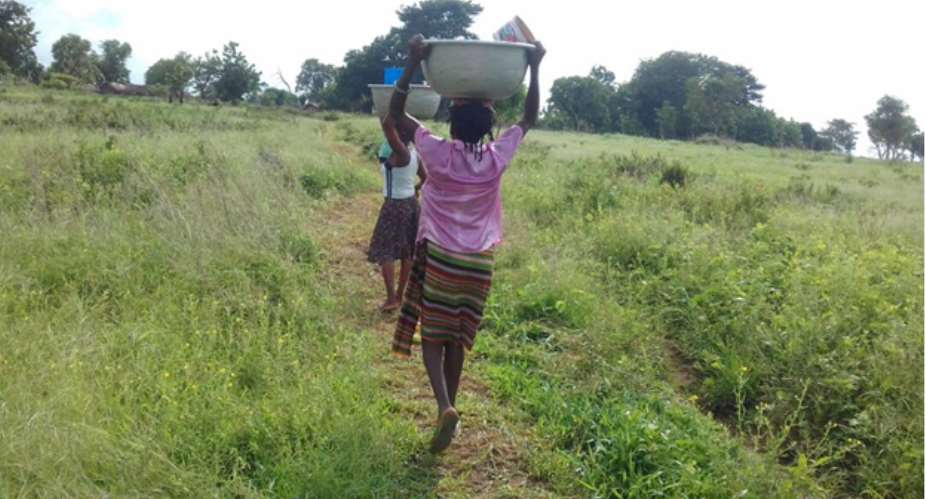For many developing countries, poverty remains the bane to sustainable growth. Countries like Ghana seek to address the canker of poverty and attain a self sufficient situation and in the long run end its over dependency on foreign aid. Of all the areas of concentration to deal with poverty, agriculture stands out as an effective route with high yielding dividend and rippled benefits.Thus, increasing agriculture productivity will provide high benefits through cheaper foods, more jobs and high income generation.
As part of the series of workshops ongoing at the University of Ghana (Legon) by Institute of Applied Science and Technology (IAST) within the College of Basic and Applied Science, discussion is being held with stakeholders to plan and implement strategies to use agriculture to eradicate poverty in Ghana for the next 20 years. The objective is to enforce respect for agriculture and achieve food sufficiency in 5 years.
To achieve this, the country has been divided into 10 blocks with 2 in the Northern Region. It is expected that 1 block will create 30,000 direct jobs, 300,000 direct jobs country wide as full delivery and 3,000,000 direct jobs by end of project. This should yield an annual revenue of 66,000,000 USD from 1 block, 660,000,000 USD countrywide as full delivery and 6,600,000,000 USD by the end of project.
Under the development plan, the project will focus on three main areas which are the Controlled greenhouse, irrigation field and animal husbandry. The Controlled Greenhouse initiative, will see to the production of foods such as tomato, cucumber, melon, okra, chili pepper on 200 hectors of land in the first 6 months. Food such as maize, yam, millet, apple, cashew, pawpaw and flowers will be produced on 500 hectors of land for the irrigation field initiative within the same period. For Animal Husbandry, fish, turkey, chicken, rabbit, cattle, goat, sheep, pigeon will be reared on 50 acres of land.
During the workshop, Prof. Nkansah, Director, IAST noted that agriculture is no longer simply the means of providing food for the population but with applied modern technology, it can accelerate the development of the entire economy of the country thereby lifting the people from poverty to middle income status and beyond. “Agriculture is not a way of life anymore. Agriculture is business” which needs right strategic planning, dedication, carefully programmed implementation and technologies and think-alike minds to transform agriculture. Hence the establish agric estates.
It was identified during the workshop that by combining the resources of rural villages into one larger Agricultural Estate the economies of scale can be employed to harness the activities of the population by providing them with agricultural inputs, introducing and teaching modern agricultural technology and farming techniques and developing marketing services. “Growers, research, extension services and technology in agriculture are thus key to successful poverty eradication”.
For many years Ghana appears to be enslaving itself by subscribing to agendas that do not answer the questions critical to the wellbeing of its people. With renewed attention to co-operatives and government desire to create massive jobs, develop agriculture and industry, the institutional, legal and regulatory framework for monetary management must be re-tooled. “Co-operatives must be allowed to be co-operatives”, Dr. NoskimAtidigah emphasized.
It was thus emphasized that co-operatives are instrumental in the promotion of agriculture for sustainable growth and poverty eradication as setting up co-operatives do not need much regulations. According to Co-operative Act, 10 people be it family, can form a co-operative body and perform mutual activities that are in compliance to the law, such as mobilize funds from members and maintain its own savings and loan schemes. These co-operatives provide the needed advantage to agriculture development as they boost and provide funding for the sector and that is more efficient and relevant to the economic wellbeing of Ghana.
About IAST, University of Ghana
The Institute of Applied Science and Technology of the University of Ghana serves as a conduit to industry and communities to access knowledge, technical skills and solutions from academia. It serves as a channel for academia to find application for the research in real life while providing the platform for proof of concept of their ideas and research before full application and commercialization.





 2024 elections: Resign if you can't be faithful to party - Sagnarigu NDC PC desc...
2024 elections: Resign if you can't be faithful to party - Sagnarigu NDC PC desc...
 Five arrested, remanded over alleged murder of two police officers at Transacco
Five arrested, remanded over alleged murder of two police officers at Transacco
 Tax exemptions better than incentives for churches – Tax Analyst tell Bawumia
Tax exemptions better than incentives for churches – Tax Analyst tell Bawumia
 Transport Minister sues Law Platform Editor for defamation
Transport Minister sues Law Platform Editor for defamation
 Voter registration: Police arrest NPP Treasurer for Mpohor for registering minor
Voter registration: Police arrest NPP Treasurer for Mpohor for registering minor
 "This nonsense must stop" — Lawrence Tetteh vows to march to Jubilee House over ...
"This nonsense must stop" — Lawrence Tetteh vows to march to Jubilee House over ...
 2024 elections: “If indeed you stand for peaceful elections the time is now for ...
2024 elections: “If indeed you stand for peaceful elections the time is now for ...
 I have the attributes to be president of this country — Bernard Monarh
I have the attributes to be president of this country — Bernard Monarh
 Cecilia Dapaah saga: ‘Turf war’ between AG, EOCO, OSP indicates they’re not ‘cor...
Cecilia Dapaah saga: ‘Turf war’ between AG, EOCO, OSP indicates they’re not ‘cor...
 Ghana will become the first African country to embrace blockchain-powered gover...
Ghana will become the first African country to embrace blockchain-powered gover...
